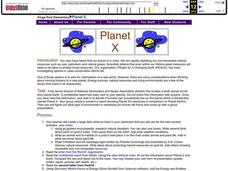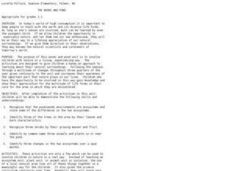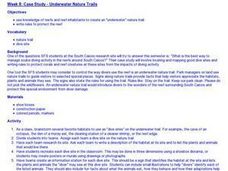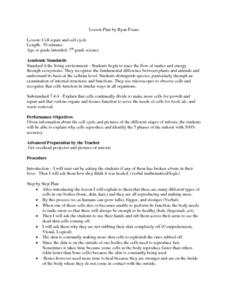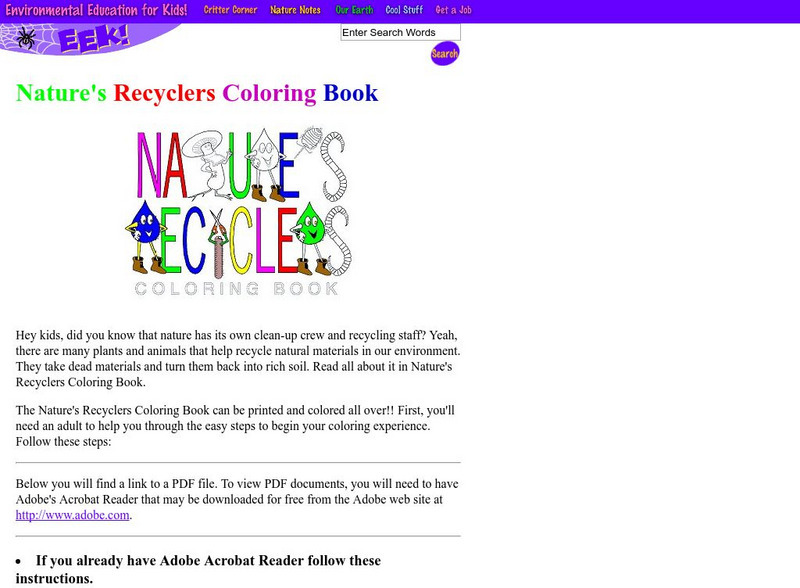Curated OER
Nature Quiz
In this nature worksheet, students complete a short answer quiz about the natural occurrences in nature. Students complete 10 questions.
Curated OER
Water Quality Monitoring
Young scholars comprehend the four parameters of water quality. They perform tests for salinity, dissolved oxygen, pH and clarity or turbidity. Students comprehend why scientists and environmental managers monitor water uality and...
Curated OER
Planet X
Students select a wide variety of presentation methods to compare Planet X and Earth. Students share these with their classmates. Students select other methods to present their ideas about a livable planet for human life forms. ...
Curated OER
Rapid Mycological Assessment
Students examine types of mycology methods. They practice using new vocabulary and answer key questions. They complete a field survey and analyze their results.
Curated OER
Furbearers of Illinois
Students study fur bearing animals of Illinois. They research a specific furbearer (it's habitat, diet, current hunting regulations regarding the animal, conservation organizations that help the animal, etc.) and give a presentation on...
Curated OER
Looking at the Community Tree
Third graders review the characteristics of living and nonliving organisms. As a class, they observe a tree and describe the interactions between the living and nonliving organisms surrounding it. To end the lesson, they ask a question...
Curated OER
Oceanography
Second graders identify saltwater and freshwater habitats and the resources found in them. They compare and contrast the two habitats and discuss their findings. They discover the resources bodies of water can provide.
Curated OER
Molecular Approaches to Evolution
Students are introduced to working with molecular data. The first activity does both simulated and original data are used to compare amino acid, protein or DNA differences to construct phylogenetic trees or cladograms. These activities...
Curated OER
City Wildlife in a Vase
Learners examine a still-life painting. They discuss the observation of nature by scientists and artists and explore the symbolism of biological life cycles depicted in a painting.
Curated OER
Beach Zonation
Students identify and separate the different zones of the beach by observation. They investigate beach zonation by gathering and comparing sand samples gathered from different areas of the beach.
Curated OER
The Woods and Pond
Students participate in hands-on activities to explore their natural surroundings. They recognize that ponds and woods are ecosystems and compare differences between the two. They identify trees by their bark and leaves.
Curated OER
Particulate Matter: How Dirty is the Air We Breathe?
Fourth graders create a simple testing device and collect and observe the pollution in the air we breathe.
Curated OER
Soil Factors
Eighth graders study the nine soil factors to use in field study and to complete an exam. They learn the components and characteristics of soil.
Curated OER
Leaking Underground/ Storage Tanks
Students engage in a lesson that is about the concept of storage tanks and how they are used. The advantages and disadvantages of them is discussed with the facts given by the teacher during lecture and concurrent discussion.
Curated OER
Underwater Nature Trails
Students research dive sites on an underwater nature trail that would introduce divers to the wonders of the reef surrounding South Caicos. They then recreate each dive site using shoe box diorama and create an information station at...
Curated OER
Think Green
Students experience and practice compositing and recycling through hands-on-activities. They distinguish between which items from their trash can be recycled, composted and reused. The process for making recycled paper is also covered in...
Curated OER
I Depend on You, You Depend on Me!
Students explore the interdependency between humans and the ecosystems. They examine how uncontrolled development threatens the rain forests. They discuss how human actions affect the rain forest.
Curated OER
What's Hiding in the Air?
Fifth graders conduct experiments to study the effects of invisible air pollutants including one with a bean plant. They examine methods of invisible air pollutants.
Curated OER
The Rock Cycle
Third graders, in groups, examine soil samples with magnifying glasses. They discuss the living and non-living things they find in their soild samples.
Curated OER
Cell Repair and Cell Cycle
Seventh graders explore the cell cycle. They view pictures of different stages of mitosis and explain why cells reproduce. They identify the five phases of mitosis: interphase, prophase, metaphase, anaphase, and telophase.
Curated OER
Earth Day
In this crossword puzzle worksheet, students identify the words that relate to Earth Day by reading the 14 clues. Students complete the crossword puzzle with the clues.
Science Education Resource Center at Carleton College
Serc: Our Big Backyard: How Does Our Local Ecosystem Change During the Year?
Get students observing the environment around their school with this activity. In this lab experiment, students keep a journal containing written observations and digital pictures of how local flora and fauna change during the school year.
Environmental Education for Kids
Eek!: Community Action & Citizen Science: Biomonitoring
Biomonitoring is the term scientists use to describe the use of plants, animals, or entire ecosystems to tell if our environment is polluted. Biomonitoring has been used by biologists and scientists to give us information about our...
Environmental Education for Kids
Eek!: Nature's Recyclers Coloring Book
Did you know that nature has its own clean-up crew and recycling staff? Yeah, there aremany plants and animals that help recycle natural materials in our environment. They take deadmaterials and turn them back into rich soil. Use this...




